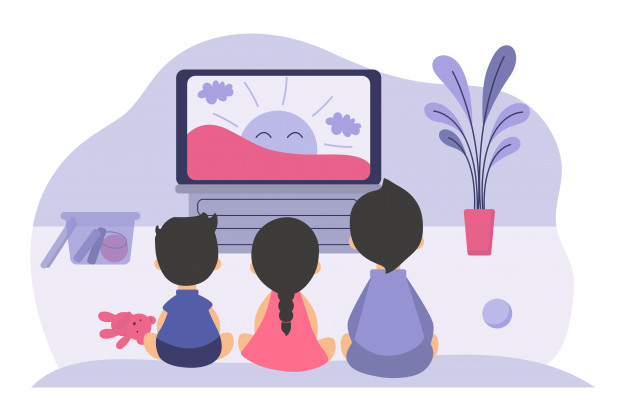
We live in the age of technology. But that doesn’t mean every type of tech is appropriate for every age group.
Teens are getting sucked in by social media. College students are using dating apps to meet, with some apps like TinderU being aimed exclusively at college kids. And according to Gabb Wireless, parents are getting their kids phones at younger and younger ages.
Don’t wait to establish good technology habits with your kids. Make sure they understand what’s safe, what’s risky, and what’s off limits altogether. Nothing good can come from exposing your kids to:
1. Online Video Games

Not all video games are bad news. In fact, some are designed to teach children collaboration and critical thinking skills.
Unfortunately, few online video games fall into that category. Most cater to the hardcore gamers, meaning they’re designed to keep your kid playing. Many include gore, violence, and sexual themes that kids simply don’t need to see.
What if you do manage to find a safe, educational online game your kid actually wants to play? More than the game itself, you should be worried about the sorts of interactions your son or daughter will have with other players. Online games’ chat rooms are full of bad behavior.
What are the long-term consequences of online games? These three should give you pause:
Obesity
There’s a direct link between child obesity and excessive video gaming. Constantly being online promotes a sedentary lifestyle, which can cause children to gain weight. In fact, U.S. children are projected to have a shorter life span than their parents in large part because of the obesity crisis.
To keep your kids healthy, encourage them to go outside. Not only will they be more active, but they’ll see that spending time with other kids in the real world is more fun than video games.
Cyberbullying
The internet is a dangerous place. It’s filled with people who would take advantage of your children if given the opportunity. Online bullies don’t care how young or sensitive the people they insult are.
Keep a close eye on your kids’ online behavior. You can use parental controls to block kids from gaming sites, and from buying games through platforms like Steam.
Privacy Breaches
Cyberbullies and other malicious gamers may see your kid as an easy target. Even if they don’t outright hack your child’s account, they may coax personal information out of them.
Don’t take the risk. If your child divulges their Social Security Number or street address, you could spend years trying to sort out identity theft.
2. Inappropriate Television

As a parent, you know too much television isn’t good for kids. But it’s not just about duration; it’s about the content. Putting your children in front of the television, even if it’s just to watch an episode, might not be what’s best for them.
Before a child is 18 months old, their brain isn’t developed enough to relate what they see on television to the real world. In fact, young kids can experience developmental issues due to watching too much television, including:
Language Skills
Children learn by interacting with other people, and particularly their parents. Television, while entertaining, doesn’t let kids communicate back and forth.
To avoid a delay in language development, children need to be spoken to. They need to learn how to pay attention to body language and to recognize different tones of voice. They can’t learn those skills by staring at a screen.
Attention Span
Television can be very engaging. With bright colors and interesting characters, children rarely get bored while watching TV.
Although that might quiet their crying, it isn’t good for them. Research suggests that kids who watch more television have a harder time paying attention to real-life events.
We’re not suggesting your kids will be irreparably harmed if they see a TV screen. But they shouldn’t be regularly watching your shows with you. Under no circumstances should you hand them the remote and walk out of the room. Streaming services, such as Disney +, offer kid profiles and specific restrictions so you have more control over what content your kids consume.
3. Handheld Devices

Smartphones and iPads are handy gadgets, but they’re also potentially addictive. Instead of letting your kids have free rein of your devices, set limits so they don’t become dependent. Otherwise, they may experience:
Impaired social skills
Kids who get too used to communicating by text or instant message may struggle to do so in the real world. Social skills are like any other: They require regular use to stay sharp.
Monitor your kids’ electronic communications closely. Make sure they’re not treating digital messaging as a substitute for actual conversation. If they are, encourage them to pay their friend a visit or to at least give them a call.
Sleep problems
Another limit you should set is when and where your child can use handheld digital devices. For example, it’s a good idea to take their electronics away before bed. Children need to get somewhere between six to eight hours of sleep. If they don’t, they’re at risk for behavioral problems and health issues.
Sleep is crucial to growth, and screens get in the way of good sleep. Melatonin, a hormone that tells the body to rest, is inhibited by the blue light screens give off.
Even if your kids are simply using their phone as an alarm, the light from every notification could disrupt their sleep. According to a study, eight percent of children admit they’re awoken by their phones at night. By taking your child’s phone away, you’re ensuring they get the rest they need.
Healthy Tech Use Is Key

Don’t get the wrong idea: Not all technologies and uses of those technologies are bad for kids. A phone can help them contact you in an emergency. Online learning is a lot better than nothing.
With that said, healthy use can easily get out of hand. An afternoon Zoom with friends can edge out enriching after-school activities. YouTube streaming can go from educational to addictive. The onus is on you to make sure it doesn’t.








